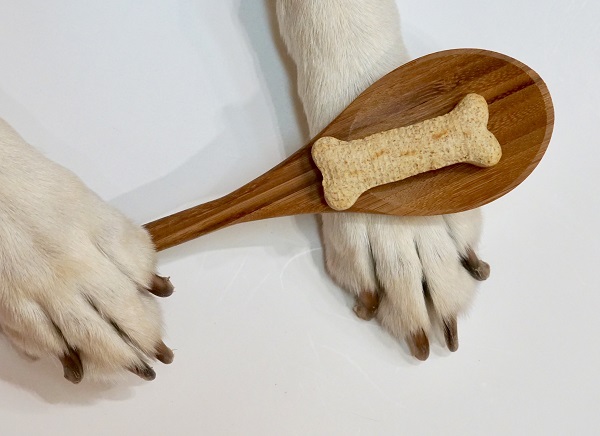You know your dog loves treats, especially when it resembles what you eat, especially in front of him. But you must know that you cannot offer your lovely pet a small piece of cookie or cake you have every time.
Pets have different nutritional requirements, and hence some foods are not considered safe for them so far as their health is concerned.
There is good news, though. It is pretty easy to bake dog treats at home as most flours used for baking are safe for dogs.
Now there are even frozen dog treats available in the market, thus making things easier for you. However, if you choose to prepare dog treats in your kitchen, it is healthy and can be prepared at any time according to the taste and liking of your dog, thus keeping in mind its unique dietary needs. You can prepare the treats in large quantities in the oven and chill them in the refrigerator for future use.
Another advantage of making treats at home is that most ingredients are already available in your pantry. Baked goodies are prepared using flour. Broth, water, or egg is mixed into it.
To make them tasty and healthy, you can add peanut butter, carrot, sweet potato, cheese, apple, bacon, or pureed pumpkin. There are endless recipes.
What are the best flours for dog treats?
Not all dog treats are prepared using flour. The recipes of the baked items call for the use of flour. You can safely give your dog food products that contain flour. Flours are made from grinding wheat, seeds, rice, or corn. Whole wheat flour is extensively used for preparing dog treats.
Other popular choices of flours are as follows:
- Almond flour
- Oat flour
- Brown rice flour
- Coconut flour
Why whole wheat flour is a popular choice over white flour?
Most pup parents prefer whole wheat flour for homemade dog treats. It is a good choice over white flour, as it has no nutritional value and is highly processed.
On the other hand, whole wheat flour is affordable, available in everybody’s kitchen, and has a lot of nutritional value that proves beneficial to your pet. Along with proteins and carbohydrates, it contains vitamins, anti-oxidants, glutens, and minerals, thus providing a healthy choice for preparing dog treats.
The only downside is it is not the best flour for dogs with allergies. They will not be able to tolerate it.
Can almond flour be used to make dog treats?
Dogs on a gluten-free diet can have snacks prepared with almond flour. But it should never be included in a regular diet. Ask your vet before including almond flour in your pet’s diet. Almond flour has many nutritional advantages like healthy fats, calcium, vitamin E, iron, and fiber, but it is hard to digest.
White almond flour used to make dog treats are high in calories. Therefore, if your dog is overweight, it is not advisable to include it in its diet.
Will my dog be able to digest oats flour?
Oats flour is a whole grain flour that is relatively easier to digest, thus making it an easy choice for pet treats. Oats are quick to cook and come packed with more protein than many common grains. Hence, it can be a healthy alternative for making dog treats.
Oats flour is packed with nutrition, thus making it a preferred choice for many dog parents. Apart from being a good source of protein and fiber, it contains iron, thiamin, riboflavin, and potassium.
More interesting is that you can grind the oats home to make the flour. Oats flour is low in calories and hence suitable for dogs trying to lose weight. Gluten-intolerant dogs can also be given oats flour treats if it is made from gluten-free oats.
Finely grounded oats or oat flour are easy on the dog’s digestive system. That’s not all. Oats are also known for their anti-inflammatory properties, thus adding to their many benefits.
High in carbohydrates, gluten-free and nutritious, your dogs will find these treats much more enjoyable. If your dog is going to have oats flour treats for the first time, it is better to combine oats flour with other flour in equal proportion and bake the treats. The result is always great. Slowly introduce the baked treats to your pup.
Read Also: 10 Foods Your Dog Should Never Eat – Toxic food for dogs
Will brown rice flour be a good choice for making dog treats at home?
Most store-bought dog treats contain brown rice flour. It is a good choice to make dog treats. It is easy to make treats with this variety of flour. It contains fiber, vitamins, minerals, potassium, antioxidants, and iron. It is readily available in the market and an affordable choice of flour. It is a bit more expensive than whole wheat flour and cannot be easily made home.
Since it is grain, dogs with grain allergies may be unable to tolerate it.
Will coconut flour be a good gluten-free option for dogs with grain allergies?
Coconut flour is gluten-free and a plant-based protein. It contains a significant amount of essential vitamins-Vitamin C and B6, calcium, and potassium.
Though it comes packed with nutrition, it is hard to work with this flour. You can mix the coconut flour with other flour and prepare your desired dog treats. Sometimes, the dogs cannot digest it as well. Moreover, the flour is not recommended for dogs having intestinal conditions because it tends to cause gas and bloating.
Apart from these popular varieties, there are chickpea flour, Quinoa flour, buckwheat flour, sorghum flour, and much more flour for dogs in the market. Each variety of flour has health benefits and certain drawbacks. You are the one who can find out what will work best for your pet as well as what will be easier to avail and make treats out of it.
Just like human beings, dogs are also intolerant to certain flours. Before baking a whole batch of treats, introduce flour to dogs in smaller quantities. Monitor if your dog can digest the food or not. If you notice any stomach upset issues or blockage of the intestine, it is better to stop giving treats made of any particular flour. You will soon find out which type of flour suits your pet and is most healthy for it.
Your veterinarian will answer if you have a question: Can your dog eat flour? The vet can inform you if your dog breed has some common allergen, and you can prepare the treat following the guidelines.
While both your vet and you can work together to prepare a healthy meal plan for your pet, many websites can help you resolve all your queries regarding the correct usage and storage of flour to make treats for your dog.
Read Also: Best Dog Food Brands in The World
Can dogs have flour in treats?
It is also important to remember that not all flours are suitable for dogs; some flours, like coconut flour, almond flour, and chickpea flour, can be used as an alternative. Also, it is important not to give too many treats to dogs, as it can lead to weight gain and other health problems.

 DogExpress
DogExpress





















 in Chandigarh, India.
in Chandigarh, India. 
